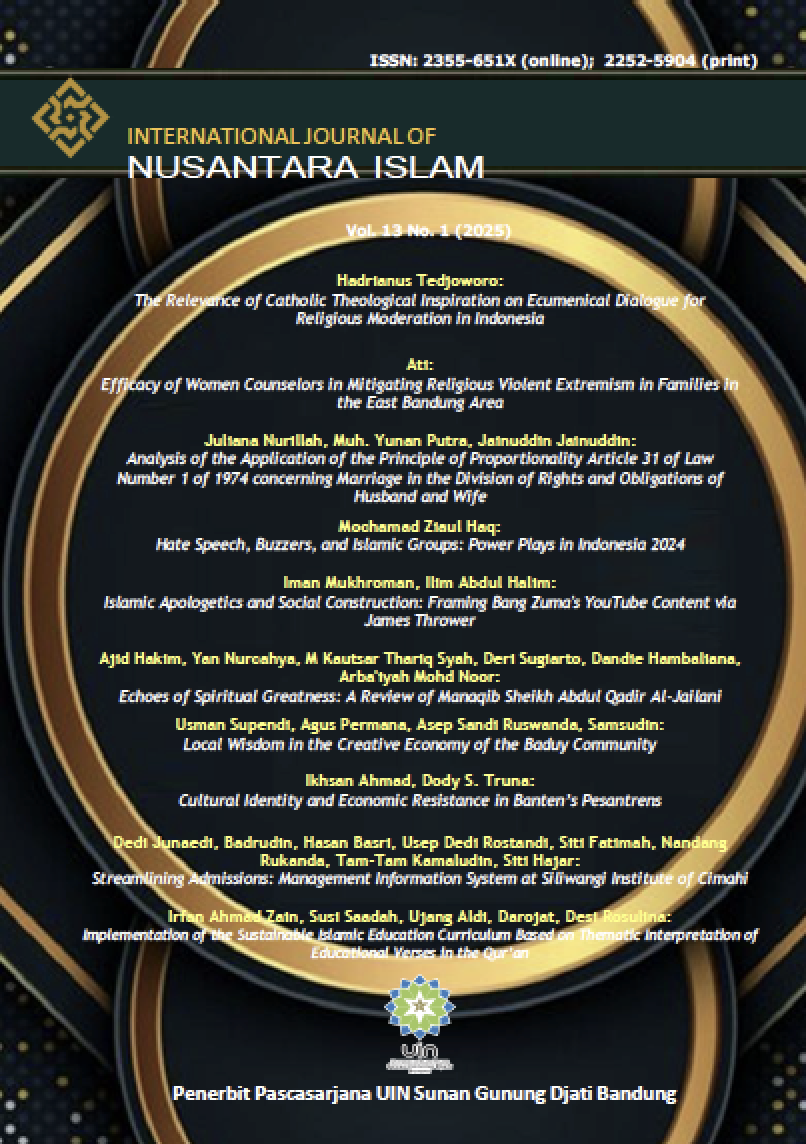The Relevance of Catholic Theological Inspiration on Ecumenical Dialogue for Religious Moderation in Indonesia
Main Article Content
Abstract
Ecumenical dialogue is part of the post-Vatican Council II Catholic theological practice that emphasizes the importance of openness to other traditions and a shared search for truth. In the Indonesian context, which is characterized by religious diversity and the challenges of intolerance and fundamentalism, Catholic theological reflection can make an important contribution to strengthening religious moderation. This study aims to identify and correlate Catholic theological ideas on ecumenical dialogue that can be the basis for developing a relevant and contextual interfaith dialogue methodology. Using a content analysis approach and correlation of theological ideas based on an integrative literature review, this study examines Church documents, the views of Catholic theologians Yves Congar, Walter Kasper, and John Paul II, and research results that discuss interreligious moderation. The results of the study indicate that receptive ecumenism, mutual spiritual enrichment, inner reform, shared witness, and learning through dialogue can be the foundation of a methodological framework for dialogue in religious moderation without losing the integrity of each faith. The practice of interfaith dialogue in Indonesia can be enriched with a transformative approach that emphasizes reciprocal learning, shared reflection of faith, and acceptance of diversity. The contribution of this research is primarily a fresh perspective and methodology in the contextual theological study of dialogue, emphasizing that Catholic theological inspirations can be used as material for compiling a program framework to advance religious moderation.
Article Details
The Authors submitting a manuscript do so on the understanding that if accepted for publication, copyright of the article shall be assigned to International Journal of Nusantara Islam, Sunan Gunung Djati State Islamic University.
The copyright encompasses exclusive rights to reproduce and disseminate articles in all forms and media, including reprints, photographs, microfilm, and similar reproductions, as well as translations. Some or all of the contents of this journal can be stored in databases and transmitted in any form and media without the need for written permission from the International Journal of Nusantara Islam, Sunan Gunung Djati State Islamic University.
The Editors and the Advisory International Editorial Board make every effort to ensure that no wrong or misleading data, opinions or statements be published in the journal. In any way, the contents of the articles and advertisements published in the International Journal of Nusantara Islam (IJNI) are sole and exclusive responsibility of their respective authors and advertisers.
References
Andika, A., Halim, A., & Mubarak, Z. (2024). Dialog Antar Umat Beragama dalam Agama Katolik (Analisis Terhadap Pemikiran Franz Magnis Suseno). Kalimah: Jurnal Studi Agama-Agama Dan Pemikiran Islam, 22(2), 67–86.
Annan, S. E. (2014). “Do not Stifle the Spirit”: The Vision of Yves Congar for Charismatic Ecclesiology. New Blackfriars, 95(1058), 443–467.
Asmara, A. H. D. (2024). The Implementation of Religious Moderation in Jesuit High Schools in Indonesia: Catholic Religious Education Teachers’ Perspectives. Proceedings of The International Conference on Theology, Religion, Culture, and Humanities, 1(2), 175–191.
Baihaqi, F. A. (2022). Katolik Garis Lucu: Membangun Jembatan Dialog Multikulturalisme di Ruang Twitter. Al-Adyan: Journal of Religious Studies, 3(1), 50–61.
Cornille, C. (2013). The Wiley-Blackwell companion to inter-religious dialogue (Vol. 120). Wiley Online Library.

